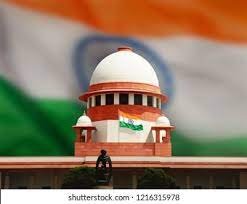This judgment addresses critical environmental and human rights issues concerning Matheran, a unique eco-sensitive hill station in Maharashtra, India. Matheran is a popular hill station in the Raigad District of Maharashtra, situated in the biologically rich Western Ghats. It is recognized as an eco-sensitive region and India’s only pedestrian hill station.
It has a permanent population of approximately 4,400 persons (as per the 2011 Census) and sees a large inflow of tourists throughout the year, especially during summer and increasingly during monsoon. The approximate footfall of tourists is around 8 lakhs annually.
Matheran was declared an Eco Sensitive Zone (ESZ) in principle on 21st November 2000. Vehicle traffic is generally restricted, with exceptions for ambulances, fire engines, and tractors for solid waste transportation.
Key Issues: The case involves two main issues:
Paver Blocks: Permission to lay paver blocks on the road between Dasturi Naka and Shivaji Maharaj Statue, a 4 km stretch that serves as a lifeline for the town. This was proposed to arrest soil erosion.
E-Rickshaws: Permission to operate battery-operated e-rickshaws to replace hand-pulled carts/rickshaws.
Law Involved:
Article 23 of the Indian Constitution: This article prohibits “traffic in human beings and forced labour”. The Court noted that this provision is a fundamental right and strikes at “traffic in human beings and begar and other similar forms of forced labour” wherever they are found. It emphasizes human dignity and prohibits actions that are violent to human values.
Precedent Cases:
People’s Union for Democratic Rights and Others v. Union of India and Others: This case established that the practice of towing human beings, even if consented to, is an inhuman practice that violates the concept of human dignity and is incompatible with the constitutional promise of social and economic justice.
Azad Rickshaw Pullers’ Union and Others v. State of Punjab: This case highlighted the “agony” and “sufferings” of rickshaw pullers, many of whom faced severe health problems, and considered the practice of manual rickshaw pulling an “inhuman practice”.
Reasoning:
Paver Blocks:
The Court considered reports from IIT Bombay and the National Environmental Engineering Research Institute (NEERI). IIT Bombay’s report suggested paver blocks as an eco-friendly option for good slip resistance, low water absorption, enhanced visual appearance, and efficient local production from recyclable/reusable materials. It also recommended measures to increase drainage and prevent waterlogging, reduce erosion, and provide foot support.
NEERI’s report confirmed that clay paver blocks are the best solution for arresting soil erosion on mud roads in Matheran. It also stated that paver blocks would reduce the “trampling effect” of horses on soil, which contributes to soil erosion.
E-rickshaws vs. Hand-pulled Carts:
The Court strongly condemned the practice of human beings towing other human beings in hand-pulled carts/rickshaws, deeming it an “inhuman practice” and a violation of human dignity and Article 23 of the Constitution. It noted that this practice had been ongoing for over 78 years, betraying the constitutional promise of social and economic justice.
Studies showed that a significant majority (61%) of rickshaw pullers suffered from acute or chronic health problems, including pulmonary tuberculosis, gastrointestinal problems, ophthalmic problems, and musculoskeletal pain.
The Court recognized that e-rickshaws represent a technological advancement that is environment-friendly, reduces pollution, and, most importantly, protects human dignity by eliminating the need for human beings to physically pull others.
The successful scheme implemented by the State of Gujarat in Kevadia (Sardar Patel Sarovar), where e-rickshaws were purchased and provided on a nominal hire basis to tribal women, was cited as a model for Matheran. This scheme uplifted beneficiaries and generated revenue.
Holding:
Paver Blocks: The Court permitted the laying of clay paver blocks on the main road from Dasturi Naka to Shivaji Maharaj Statue. This decision was based on the findings that paver blocks are the best solution for arresting soil erosion and offer environmental and aesthetic benefits. Other proposed measures for drainage and erosion control, as recommended by IIT Bombay and NEERI, are also to be implemented.
Hand-pulled Carts/Rickshaws: The Court directed the State of Maharashtra to stop the practice of plying hand-pulled carts/rickshaws in Matheran in a phased manner within a period of six months.
E-rickshaws: The State Government is mandated to evolve a scheme, similar to the Kevadia model in Gujarat, for introducing e-rickshaws in Matheran. The scheme should prioritize the allotment of e-rickshaws to genuine hand cart/rickshaw pullers. The State Government is also to bear the expenses for necessary training and ensure that eligible hand cart/rickshaw pullers are given priority in allotment. Funding for this scheme can be explored through Corporate Social Responsibility (CSR) funds or other available modes.
IN RE : T.N. GODAVARMAN THIRUMULPAD V. UNION OF INDIA
Supreme Court: 2025 INSC 996 (DoJ 06-08-2025)






